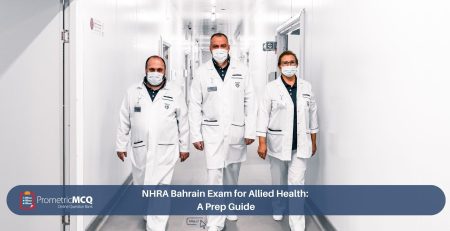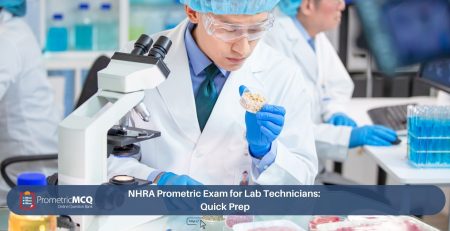
NHRA Bahrain Dental Exam: A Quick and Easy Study Plan
fatima@prometricmcq.com2025-09-26T23:46:13+00:00Table of Contents
ToggleNHRA Bahrain Dental Exam: A Quick and Easy Study Plan (2025)
The Kingdom of Bahrain, with its sophisticated healthcare system and high standard of living, is an increasingly attractive destination for dental professionals from across the globe. Gaining the license to practice in this vibrant nation requires passing the National Health Regulatory Authority (NHRA) Dental Exam. For many busy clinicians, the thought of preparing for such a comprehensive exam can be daunting. The syllabus seems vast, and finding the time to study effectively feels like an impossible task. However, passing the NHRA exam is not about studying harder; it’s about studying smarter.
The secret to success lies not in trying to memorize every page of every textbook, but in adopting a structured, efficient, and high-yield study plan. The NHRA exam is a test of clinical reasoning, not just factual recall. It is designed to ensure you can apply your knowledge to real-world patient scenarios safely and effectively. Therefore, a “quick and easy” study plan is one that focuses intensely on the most frequently tested concepts and utilizes the most effective learning tool available: practice with high-quality, case-based Multiple-Choice Questions (MCQs).
This ultimate 2025 guide provides a detailed, week-by-week study plan designed for the busy dental professional. We will break down the entire preparation process into manageable phases, focusing on high-yield topics across all major dental specialties. This practical framework is supplemented with sample questions, strategic advice, and a comprehensive 10-point FAQ section to demystify the entire process. Our goal is to provide you with a clear, actionable, and low-stress path to acing your NHRA Dental Exam.
Key Takeaways for an Efficient Study Plan
- Structure is Your Friend: A week-by-week plan prevents overwhelm and ensures you cover all essential topics without cramming.
- Focus on High-Yield Topics: 80% of the exam questions will likely come from 20% of the syllabus. We will identify that 20% for you.
- Active Learning is Key: Your study time should be dominated by solving MCQs, not passively reading. This is the fastest way to build applicable knowledge.
- Diagnosis & Treatment Planning: These are the two most critical skills tested. Every practice question should be viewed through this lens.
- Simulation Builds Confidence: Regular, timed mock tests are non-negotiable for mastering pacing and reducing exam day anxiety.
Understanding the NHRA Dental Exam Pattern
Before diving into the study plan, you must understand the structure of the exam you’re facing. This knowledge is fundamental to effective Bahrain NHRA exam preparation.
- Format: A Computer-Based Test (CBT) administered at a Prometric center.
- Structure: 150 Multiple-Choice Questions (MCQs).
- Duration: 3 hours (180 minutes).
- Scoring: A simple Pass/Fail result. There is no negative marking.
The exam is a comprehensive assessment of a general dentist’s competency. For a more detailed breakdown of the format across all professions, you can review our guide to the NHRA exam pattern for all professions.
The 8-Week Quick and Easy Study Plan
This plan is designed for a working professional and can be condensed to 6 weeks with more intensive daily study. It is built on the principle of mastering one domain at a time through question-based learning.
Phase 1: Foundation and Diagnostics (Weeks 1-2)
The goal of this phase is to build a solid foundation and identify your specific areas of weakness.
- Week 1: Focus on the absolute fundamentals. Review Oral Pathology, Radiology, and Diagnosis. Spend time getting comfortable with interpreting radiographs (PAs, Bitewings, OPGs) and recognizing common oral lesions. At the end of the week, take a full-length **diagnostic mock test**. The score is not important; the goal is to get a baseline and see which subjects you struggled with most.
- Week 2: Dive into Operative Dentistry and Dental Materials. These are high-yield topics. Master G.V. Black’s classifications, the principles of adhesion, and the properties of composites, amalgams, and glass ionomers. Begin your daily habit of solving 25-30 MCQs from a dedicated Dentistry MCQs QBank.
Phase 2: Core Clinical Specialties (Weeks 3-6)
This is the intensive learning phase. Dedicate each week to a core specialty, using your QBank as your primary study tool.
- Week 3: Endodontics. Focus on the diagnosis of pulpal and periapical diseases, root canal anatomy, access cavity design for different teeth, and the management of endodontic emergencies.
- Week 4: Prosthodontics. Cover the principles of tooth preparation for crowns and bridges, impression materials, and the fundamentals of complete and removable partial dentures.
- Week 5: Oral Surgery & Local Anesthesia. Master the techniques and pharmacology of local anesthesia, indications for extraction, management of impacted third molars, and post-operative complications.
- Week 6: Periodontics & Pediatric Dentistry. For Perio, focus on the classification of periodontal diseases and the principles of non-surgical therapy. For Pedo, focus on managing caries in primary teeth, pulp therapy (pulpotomy), and space maintainers. At the end of this week, take your **second full-length mock test** to track your progress.
Phase 3: Integration and Final Simulation (Weeks 7-8)
This phase is about tying everything together and preparing for the exam day experience.
- Week 7: Mixed Review and Weak Areas. Use the data from your second mock test to identify your remaining weak areas. Do mixed blocks of 50 questions daily from your QBank, covering all subjects. This builds your ability to switch between topics, just like in the real exam.
- Week 8: Final Simulation and Rest. Take your **third and final mock test** at the beginning of the week under strict exam conditions. Spend the next 2-3 days doing a deep review of that test. For the final 48 hours, do not study. Relax, confirm your logistics, and get plenty of sleep.
High-Yield Topics You Absolutely Must Know
To make your study plan truly “quick and easy,” you must focus on these high-yield concepts:
- Diagnosis of Dental Pain: Differentiating between reversible pulpitis, irreversible pulpitis, and pulpal necrosis.
- Radiographic Interpretation: Identifying periapical radiolucencies, caries, bone loss, and common cysts/tumors.
- Local Anesthesia: Maximum safe dosages, landmarks for common injection techniques (IANB), and management of complications like hematoma or trismus.
- Dental Emergencies: Management of avulsed teeth, acute abscesses, and post-extraction bleeding.
- Medical Emergencies in the Dental Office: Recognizing and providing initial management for syncope, hypoglycemia, and anaphylaxis.
Frequently Asked Questions (FAQs) for the NHRA Dental Exam
The exam is graded Pass/Fail. The NHRA does not publish an official passing percentage, but the accepted benchmark among successful candidates is approximately 60% to 65%. Aiming for a consistent score of 70% or higher in your mock tests is a safe strategy.
The NHRA typically allows candidates three attempts to pass their licensure exam. A waiting period is required between each attempt. Failing three times may require you to undertake additional training before you are eligible to re-apply.
Yes, it is mandatory. Primary Source Verification (PSV) is a process where the DataFlow Group independently verifies your credentials (dental degree, license, experience letters) directly with the issuing institutions. You must have a positive PSV report before your license to practice in Bahrain can be issued.
The NHRA dental exam focuses on international clinical standards, evidence-based practice, and professional ethics. It does not typically include questions on specific administrative laws of Bahrain. Your preparation should be based on globally recognized dental guidelines, such as those from the American Dental Association (ADA).
No. The exam uses only generic names for all materials and drugs. You need to be familiar with the classification and properties of materials (e.g., “flowable composite,” “polyvinyl siloxane”) rather than specific brand names.
As a general dentist, you are expected to understand the fundamentals. This includes case selection, identifying adequate bone, understanding the basic components (implant, abutment, crown), and recognizing complications like peri-implantitis. You will not be tested on advanced surgical placement techniques.
The only way to improve your pacing is by practicing under timed conditions. Start with smaller blocks of timed questions (e.g., 50 questions in 60 minutes) and build up to taking full 150-question mock exams in a single 3-hour session. This builds both speed and mental endurance.
The single most important document is your original, valid passport. The name on your passport must be an exact match to the name on your Prometric registration. No other ID is typically accepted. Also, bring your booking confirmation number.
Since there is no negative marking, you must never leave a question blank. Use the process of elimination to rule out one or two obviously incorrect options. Then, make your best-educated guess from the remaining choices, flag the question, and move on. You can return to it later if you have time.
It is crucial to use a high-quality question bank from a reputable source that specializes in Gulf healthcare licensing exams. A comprehensive platform that offers dedicated and up-to-date resources for the NHRA exam is your best investment. For example, exploring a complete set of dentistry MCQs can provide the breadth of practice you need.
Conclusion: A Smart Path to Your Bahrain Dental Career
The NHRA Dental Exam is a significant professional milestone, but it does not have to be an overwhelming one. By replacing aimless, marathon study sessions with a structured, efficient, and question-focused plan, you can prepare effectively without sacrificing your personal and professional life. This “quick and easy” plan is about strategic focus, not shortcuts. Trust the process, commit to active learning, and you will be fully equipped to pass your exam and begin a rewarding dental career in the Kingdom of Bahrain.
Ready to Execute Your Study Plan with the Best Tools?
Our comprehensive MCQ package for dentists is filled with high-yield questions, realistic case scenarios, and detailed rationales designed to mirror the NHRA exam and guarantee your success.










